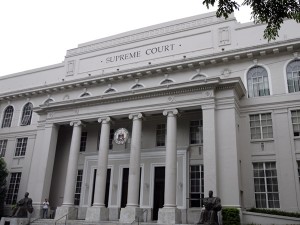MANILA, Philippines—The heir of human rights lawyer Wilson Gamboa and several lawyers asked the Supreme Court on Tuesday to declare as “unconstitutional” the liberal framework drafted by the Securities and Exchange Commission on foreign ownership in key industries like utilities.
Wilson Gamboa Jr., now a Bacolod City councilor, filed a petition in intervention to compel the SEC to issue new guidelines regarding the determination of compliance to the Constitutional restriction on foreign ownership in some industries. Lawyer Jose Roy III was the original petitioner in this case.
As a consequence of the death of his father who had obtained a favorable decision from the Supreme Court in the Gamboa vs. Teves, et. al., case questioning foreign ownership in Philippine Long Distance Telephone Co., the younger Gamboa substituted himself in the case.
Any deviation from the decision would amount to a contempt of court, stated the petition, which named the Securities and Exchange Commission, SEC chair Teresita Herbosa and PLDT as respondents.
Gamboa asked the Supreme Court to direct the SEC to re-investigate PLDT and determine whether it has violated the Constitution in accordance with the ruling of the high court in the Gamboa cases.
The petition likewise asked the high tribunal to:
* direct the SEC to impose proper penalties against PLDT if it has violated the Constitution;
* declare that the PLDT Beneficial Trust Fund is not a Philippine national, and that any corporation in which it owns more than sixty percent 60 percent of the outstanding capital stock should also be declared as a foreign corporation; and,
* direct the SEC to conduct an investigation on all corporations in which PLDT Beneficial Trust Fund made an investment to determine whether those corporations and their subsidiaries violated the constitutional mandate enshrined in Section 11, Article XII and Section 11 Article XVI of the Constitution.
Petitioners said they were entitled to join in this case based on the doctrine enunciated by the Supreme Court in the Gamboa case.
The petition said that as citizens of the Philippines and taxpayers, they “cannot idly stand while the SEC wastes government funds in implementing the erroneous guideline, noting that the interpretation by the SEC of the term “capital” is considered equally important since, even if erroneous, this SEC interpretation – left to stand – would be the basis used by all entities for testing compliance with the 60-40 foreign ownership rule.
Since a specific class of shares may have rights and privileges or restrictions different from the rest of the shares in a corporation, the petitioners said the 60-40 ownership requirement in favor of Filipino citizens in the Constitution must apply not only to shares without voting rights.
“Preferred shares, denied the right to vote in the election of directors, are anyway still entitled to vote on the eight specific corporate matters mentioned above. Thus, if a corporation, engaged in a partially nationalized industry, issues a mixture of common and preferred non-voting shares, at least 60 percent of the common shares and at least 60 percent of the preferred non-voting shares must be owned by Filipinos. Of course, if a corporation issues only a single class of shares, at least 60 percent of such shares must necessarily be owned by Filipinos. In short, the 60-40 ownership requirement in favor of Filipino citizens must apply separately to each class of shares, whether common, preferred non-voting, preferred voting or any other class of shares,” the petition said.
The petitioners argued that the SEC’s guidelines “practically encourages circumvention of the 60-40 ownership rule by allowing the creation of several classes of voting shares with different degrees of beneficial ownership over the same, but at the same time, not imposing a 40 percent limit on foreign ownership of the higher yielding stocks.”
